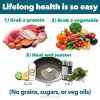CherryAA
Well-Known Member
- Messages
- 2,170
- Type of diabetes
- Type 2
- Treatment type
- Diet only
Try this
http://www.who.int/dietphysicalactivity/publications/9789241599979/en/
There are several dozen peer reviewed academic papers listed at the end which have been used as evidence for what has been stated here.
No big business or big pharma stands to benefit from the recommendations, only the people who take it into account.
Physical inactivity (6% of all deaths) is the 4th highest cause of global mortality after high blood pressure (13%), smoking (9%), and high blood glucose (also 6%). As increased activity can reduce blood pressure and blood glucose it may be the most important of all.
I'm afraid when confronted with this type of report my own reaction is pretty much "bleh" . I very much doubt there are true " randomised control trials" of people being made to sit still versus move over periods of years that result in statistically significant death rate differences. The fact is that the" eat less / move more campaign" has been peddling the news that we are all fat lazy slobs not able to deal with our appetites or get off our chairs for decades and WHO is just as culpable in that as anyone else. Big foods and big pharma both stand to gain from the recommendation. Why has coca cola been allowed to sponsor the Olympic Games ? because it allows the continuation of the myth that you can eat what you like - i.e. our products, as long as you exercise more.
Currently WHO still sits behind global dietary guidelines that are causing ill health and death in thousands if not millions. While ever we believe in this propaganda it allows the food and pharma industries to carry on peddling the rubbish they do and for the food industry to get away with the "personal sloth" hypothesis.
If everyone sat on their backsides, refused to moved and just ate good quality foods, we would soon see just how important diet is versus movement. In practice this latter scenario is never going to happen, because actually if people eat good quality foods then they will WANT to move more if they can because moving is fun. However for morbidly obese people starting on this journey ALL that matters is that you get started, move towards eating the right foods, BEGIN the journey, everything else will fall into place including exercise commensurate with your capabilities. No-one should be put off from starting because having spent years being unable to move much, they now think that somehow unless they can not only change their diet radically, but also change their personal exercise habits radically at the same time, they cannot succeed. Nothing can be further from truth, every single day that someone manages to keep on the nutrition journey gets them closer to the health benefits that they are looking for and the ability to get started on that moving more route. For a start all that is required is the diet, and if you can manage some gentle walking too then that's great, but no-one should be out off from starting because they believe that without exercise nutritional change is pointless.
basically if you want to get started, just follow this simple guide, as you get into it sure, find out more about recipes, ketones, exercise etc etc.
but just doing this for your food will make a huge difference

